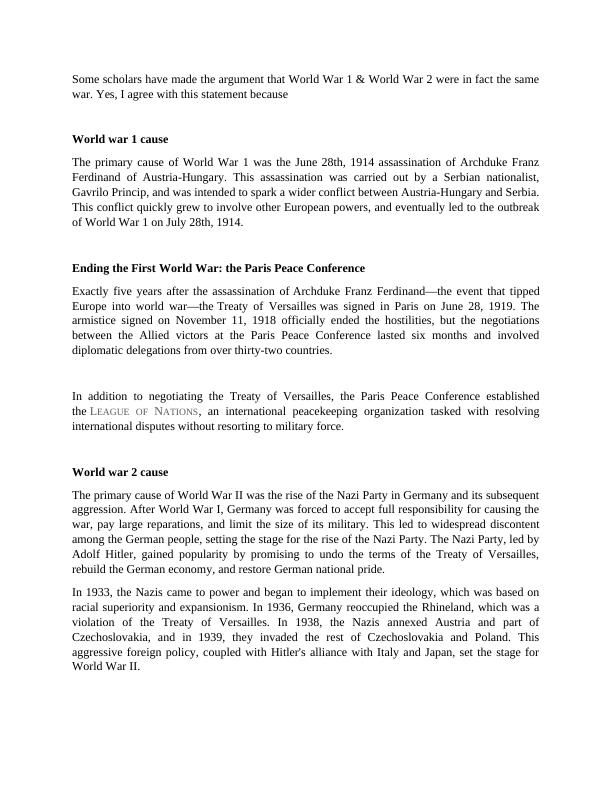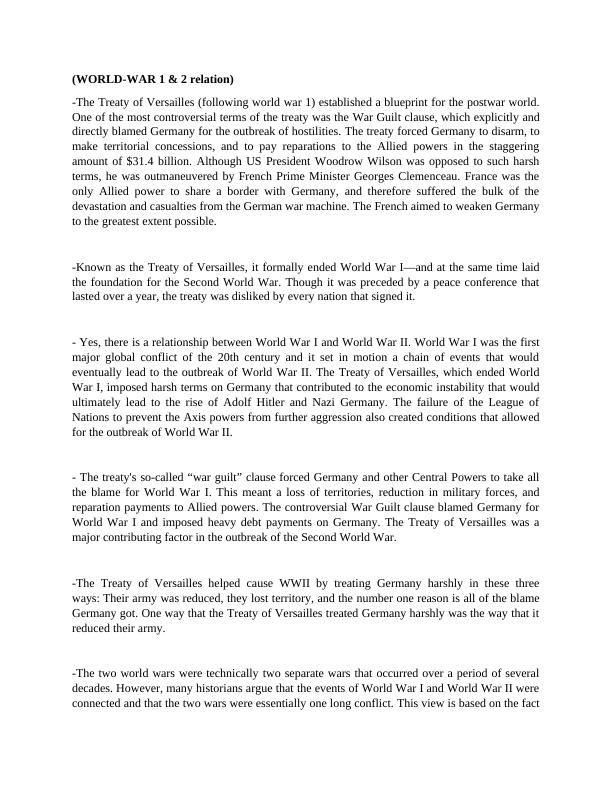World War 1 & World War 2: Same War?
Added on 2023-02-06
4 Pages1344 Words77 Views
Some scholars have made the argument that World War 1 & World War 2 were in fact the same
war. Yes, I agree with this statement because
World war 1 cause
The primary cause of World War 1 was the June 28th, 1914 assassination of Archduke Franz
Ferdinand of Austria-Hungary. This assassination was carried out by a Serbian nationalist,
Gavrilo Princip, and was intended to spark a wider conflict between Austria-Hungary and Serbia.
This conflict quickly grew to involve other European powers, and eventually led to the outbreak
of World War 1 on July 28th, 1914.
Ending the First World War: the Paris Peace Conference
Exactly five years after the assassination of Archduke Franz Ferdinand—the event that tipped
Europe into world war—the Treaty of Versailles was signed in Paris on June 28, 1919. The
armistice signed on November 11, 1918 officially ended the hostilities, but the negotiations
between the Allied victors at the Paris Peace Conference lasted six months and involved
diplomatic delegations from over thirty-two countries.
In addition to negotiating the Treaty of Versailles, the Paris Peace Conference established
the LEAGUE OF NATIONS, an international peacekeeping organization tasked with resolving
international disputes without resorting to military force.
World war 2 cause
The primary cause of World War II was the rise of the Nazi Party in Germany and its subsequent
aggression. After World War I, Germany was forced to accept full responsibility for causing the
war, pay large reparations, and limit the size of its military. This led to widespread discontent
among the German people, setting the stage for the rise of the Nazi Party. The Nazi Party, led by
Adolf Hitler, gained popularity by promising to undo the terms of the Treaty of Versailles,
rebuild the German economy, and restore German national pride.
In 1933, the Nazis came to power and began to implement their ideology, which was based on
racial superiority and expansionism. In 1936, Germany reoccupied the Rhineland, which was a
violation of the Treaty of Versailles. In 1938, the Nazis annexed Austria and part of
Czechoslovakia, and in 1939, they invaded the rest of Czechoslovakia and Poland. This
aggressive foreign policy, coupled with Hitler's alliance with Italy and Japan, set the stage for
World War II.
war. Yes, I agree with this statement because
World war 1 cause
The primary cause of World War 1 was the June 28th, 1914 assassination of Archduke Franz
Ferdinand of Austria-Hungary. This assassination was carried out by a Serbian nationalist,
Gavrilo Princip, and was intended to spark a wider conflict between Austria-Hungary and Serbia.
This conflict quickly grew to involve other European powers, and eventually led to the outbreak
of World War 1 on July 28th, 1914.
Ending the First World War: the Paris Peace Conference
Exactly five years after the assassination of Archduke Franz Ferdinand—the event that tipped
Europe into world war—the Treaty of Versailles was signed in Paris on June 28, 1919. The
armistice signed on November 11, 1918 officially ended the hostilities, but the negotiations
between the Allied victors at the Paris Peace Conference lasted six months and involved
diplomatic delegations from over thirty-two countries.
In addition to negotiating the Treaty of Versailles, the Paris Peace Conference established
the LEAGUE OF NATIONS, an international peacekeeping organization tasked with resolving
international disputes without resorting to military force.
World war 2 cause
The primary cause of World War II was the rise of the Nazi Party in Germany and its subsequent
aggression. After World War I, Germany was forced to accept full responsibility for causing the
war, pay large reparations, and limit the size of its military. This led to widespread discontent
among the German people, setting the stage for the rise of the Nazi Party. The Nazi Party, led by
Adolf Hitler, gained popularity by promising to undo the terms of the Treaty of Versailles,
rebuild the German economy, and restore German national pride.
In 1933, the Nazis came to power and began to implement their ideology, which was based on
racial superiority and expansionism. In 1936, Germany reoccupied the Rhineland, which was a
violation of the Treaty of Versailles. In 1938, the Nazis annexed Austria and part of
Czechoslovakia, and in 1939, they invaded the rest of Czechoslovakia and Poland. This
aggressive foreign policy, coupled with Hitler's alliance with Italy and Japan, set the stage for
World War II.

(WORLD-WAR 1 & 2 relation)
-The Treaty of Versailles (following world war 1) established a blueprint for the postwar world.
One of the most controversial terms of the treaty was the War Guilt clause, which explicitly and
directly blamed Germany for the outbreak of hostilities. The treaty forced Germany to disarm, to
make territorial concessions, and to pay reparations to the Allied powers in the staggering
amount of $31.4 billion. Although US President Woodrow Wilson was opposed to such harsh
terms, he was outmaneuvered by French Prime Minister Georges Clemenceau. France was the
only Allied power to share a border with Germany, and therefore suffered the bulk of the
devastation and casualties from the German war machine. The French aimed to weaken Germany
to the greatest extent possible.
-Known as the Treaty of Versailles, it formally ended World War I—and at the same time laid
the foundation for the Second World War. Though it was preceded by a peace conference that
lasted over a year, the treaty was disliked by every nation that signed it.
- Yes, there is a relationship between World War I and World War II. World War I was the first
major global conflict of the 20th century and it set in motion a chain of events that would
eventually lead to the outbreak of World War II. The Treaty of Versailles, which ended World
War I, imposed harsh terms on Germany that contributed to the economic instability that would
ultimately lead to the rise of Adolf Hitler and Nazi Germany. The failure of the League of
Nations to prevent the Axis powers from further aggression also created conditions that allowed
for the outbreak of World War II.
- The treaty's so-called “war guilt” clause forced Germany and other Central Powers to take all
the blame for World War I. This meant a loss of territories, reduction in military forces, and
reparation payments to Allied powers. The controversial War Guilt clause blamed Germany for
World War I and imposed heavy debt payments on Germany. The Treaty of Versailles was a
major contributing factor in the outbreak of the Second World War.
-The Treaty of Versailles helped cause WWII by treating Germany harshly in these three
ways: Their army was reduced, they lost territory, and the number one reason is all of the blame
Germany got. One way that the Treaty of Versailles treated Germany harshly was the way that it
reduced their army.
-The two world wars were technically two separate wars that occurred over a period of several
decades. However, many historians argue that the events of World War I and World War II were
connected and that the two wars were essentially one long conflict. This view is based on the fact
-The Treaty of Versailles (following world war 1) established a blueprint for the postwar world.
One of the most controversial terms of the treaty was the War Guilt clause, which explicitly and
directly blamed Germany for the outbreak of hostilities. The treaty forced Germany to disarm, to
make territorial concessions, and to pay reparations to the Allied powers in the staggering
amount of $31.4 billion. Although US President Woodrow Wilson was opposed to such harsh
terms, he was outmaneuvered by French Prime Minister Georges Clemenceau. France was the
only Allied power to share a border with Germany, and therefore suffered the bulk of the
devastation and casualties from the German war machine. The French aimed to weaken Germany
to the greatest extent possible.
-Known as the Treaty of Versailles, it formally ended World War I—and at the same time laid
the foundation for the Second World War. Though it was preceded by a peace conference that
lasted over a year, the treaty was disliked by every nation that signed it.
- Yes, there is a relationship between World War I and World War II. World War I was the first
major global conflict of the 20th century and it set in motion a chain of events that would
eventually lead to the outbreak of World War II. The Treaty of Versailles, which ended World
War I, imposed harsh terms on Germany that contributed to the economic instability that would
ultimately lead to the rise of Adolf Hitler and Nazi Germany. The failure of the League of
Nations to prevent the Axis powers from further aggression also created conditions that allowed
for the outbreak of World War II.
- The treaty's so-called “war guilt” clause forced Germany and other Central Powers to take all
the blame for World War I. This meant a loss of territories, reduction in military forces, and
reparation payments to Allied powers. The controversial War Guilt clause blamed Germany for
World War I and imposed heavy debt payments on Germany. The Treaty of Versailles was a
major contributing factor in the outbreak of the Second World War.
-The Treaty of Versailles helped cause WWII by treating Germany harshly in these three
ways: Their army was reduced, they lost territory, and the number one reason is all of the blame
Germany got. One way that the Treaty of Versailles treated Germany harshly was the way that it
reduced their army.
-The two world wars were technically two separate wars that occurred over a period of several
decades. However, many historians argue that the events of World War I and World War II were
connected and that the two wars were essentially one long conflict. This view is based on the fact

End of preview
Want to access all the pages? Upload your documents or become a member.
Related Documents
Myths of the Great War PDFlg...
|15
|3765
|38
The First World - Assignmentlg...
|9
|3037
|451
History - The first world war in Europelg...
|14
|3739
|20
Causes and consequences of second world war PDFlg...
|11
|2451
|266
The Great War Project: Reflections, Character Study, Letter Writing, and Secondary Source Evaluationlg...
|8
|2249
|265
World War II Historylg...
|9
|2674
|76
